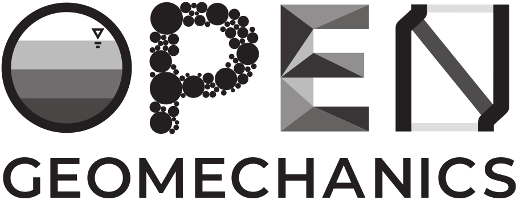Glaciation cycles are one aspect to be considered in assessing the safety of deep geological repository sites for long-term radioactive waste storage. This study examines the impact of time-dependent boundary conditions and thermo-hydro-mechanical (THM) couplings on geological formations under glaciation-induced stresses, pressures and temperature changes. Using OpenGeoSys, an open-source finite element simulator, we analyzed various process couplings to understand the underlying physical processes and numerical instabilities. We simulated vertical cross-sections of geological models relevant to nuclear waste repository sites, incorporating comprehensive geological data to capture the formations’ heterogeneity and structural features. A viscoelastic material model was used for rock salt strata to account for dislocation creep and pressure-solution creep. The study benefited from rigorous automation of the entire simulation workflow, making the setup suitable for evaluating actual repository sites regarding integrity criteria. Although the modeled rock salt strata were hydraulically deactivated, results were highly dependent on hydraulic boundary conditions. Groundwater flow significantly altered the geological temperature profile via advective heat transport and influenced the temperature-dependent creep behavior. The rock salt creep law, applied over the extensive timescales at hand, approached the limits of the Finite Element Method (FEM) with small-strain assumptions. Throughout the modeled glacial cycle, the salt strata exhibit low deviatoric stresses. Fluid pressure and dilatancy criteria are not violated in the repository during the modeled period.
Revised:
Accepted:
Published online:
 CC-BY-NC-SA 4.0
CC-BY-NC-SA 4.0
@article{OGEO_2024__5__A3_0,
author = {Zill, Florian and Silbermann, Christian B. and Meisel, Tobias and Magri, Fabiano and Nagel, Thomas},
title = {Far-field modelling of {THM} processes in rock salt formations},
journal = {Open Geomechanics},
eid = {3},
pages = {1--16},
year = {2024},
publisher = {Alert Geomaterials},
volume = {5},
doi = {10.5802/ogeo.20},
language = {en},
url = {https://opengeomechanics.centre-mersenne.org/articles/10.5802/ogeo.20/}
}
TY - JOUR AU - Zill, Florian AU - Silbermann, Christian B. AU - Meisel, Tobias AU - Magri, Fabiano AU - Nagel, Thomas TI - Far-field modelling of THM processes in rock salt formations JO - Open Geomechanics PY - 2024 SP - 1 EP - 16 VL - 5 PB - Alert Geomaterials UR - https://opengeomechanics.centre-mersenne.org/articles/10.5802/ogeo.20/ DO - 10.5802/ogeo.20 LA - en ID - OGEO_2024__5__A3_0 ER -
%0 Journal Article %A Zill, Florian %A Silbermann, Christian B. %A Meisel, Tobias %A Magri, Fabiano %A Nagel, Thomas %T Far-field modelling of THM processes in rock salt formations %J Open Geomechanics %D 2024 %P 1-16 %V 5 %I Alert Geomaterials %U https://opengeomechanics.centre-mersenne.org/articles/10.5802/ogeo.20/ %R 10.5802/ogeo.20 %G en %F OGEO_2024__5__A3_0
Zill, Florian; Silbermann, Christian B.; Meisel, Tobias; Magri, Fabiano; Nagel, Thomas. Far-field modelling of THM processes in rock salt formations. Open Geomechanics, Volume 5 (2024), article no. 3, 16 p.. doi: 10.5802/ogeo.20
[1] RESUS. Fundamentals for the evaluation of a repository system in a clay formation of greater thickness (2020) https://www.bge-technology.de/fileadmin/user_upload/fue_berichte/resus/2020-resus-grs-571.pdf (Technical report)
[2] Gesetz zur Suche und Auswahl eines Standortes für ein Endlager für hochradioaktive Abfälle (Standortauswahlgesetz - StandAG), 2023 https://www.gesetze-im-internet.de/standag_2017/bjnr107410017.html
[3] et al. KOSINA - Concept developments for a generic repository for heat-generating waste in bedded salt formations in Germany, BGE TECHNOLOGY GmbH, BGE TEC, Volume 13 (2018) https://www.bge-technology.de/fileadmin/user_upload/fue_berichte/kosina-project_concept-developments-for-a-generic-repository-for-heat-generating-waste-in-bedded-salt-formations.pdf
[4] RESUS. Fundamentals for the evaluation of a repository system in shallow salt formations (2020) https://www.bge-technology.de/fileadmin/user_upload/fue_berichte/resus/2020-resus-grs-568.pdf (Technical report)
[5] Development of Open-Source Porous Media Simulators: Principles and Experiences, Transport in Porous Media, Volume 130 (2019) no. 1, pp. 337-361 | DOI
[6] Very slow creep tests on salt samples, Rock Mechanics and Rock Engineering, Volume 52 (2019), pp. 2917-2934 | DOI
[7] OpenGeoSys, 2024 | DOI
[8] Transient hydrodynamics within intercratonic sedimentary basins during glacial cycles, Journal of Geophysical Research: Earth Surface, Volume 113 (2008) no. 4, pp. 1-17 | DOI
[9] et al. Evaluation of the potential for dissolved oxygen ingress into deep sedimentary basins during a glaciation event, Geofluids, Volume 2018 (2018) | DOI
[10] Time effects in rock mechanics, 350, Wiley New York, 1998
[11] Self-healing characteristics of damaged rock salt under different healing conditions, Materials, Volume 6 (2013) no. 8, pp. 3438-3450 | DOI
[12] Geomechanical investigations into the hydraulic integrity of geological barriers, International Journal of Rock Mechanics and Mining Sciences, Volume 41 (2004), pp. 286-291 | DOI
[13] Pleistocene temperatures, The Journal of geology, Volume 63 (1955) no. 6, pp. 538-578 | DOI
[14] Modelling and simulation methods applied to coupled problems in porous-media mechanics, Archive of Applied Mechanics, Volume 89 (2019) no. 4, pp. 609-628 | DOI
[15] et al. Radioactive waste under conditions of future ice ages, Snow and Ice-Related Hazards, Risks, and Disasters, Elsevier, 2021, pp. 323-375 | DOI
[16] et al. Groundwater flow and heat transport for systems undergoing freeze-thaw: Intercomparison of numerical simulators for 2D test cases, Advances in Water Resources, Volume 114 (2018), pp. 196-218 | DOI
[17] The role of pressure solution creep in the ductility of the Earth’s upper crust, Advances in Geophysics, Volume 54 (2013), pp. 47-179 | DOI
[18] Permeability measurements of rock salt, Journal of geophysical research, Volume 66 (1961) no. 11, pp. 3913-3921 | DOI
[19] Physical modeling of ice-sheet-induced salt movements using the example of northern Germany, EGUsphere, Volume 2023 (2023), pp. 1-32 | DOI
[20] Discriminating glacier thermal and dynamic regimes in the sedimentary record, Sedimentary Geology, Volume 251 (2012), pp. 1-33 | DOI
[21] Rock salt—the mechanical properties of the host rock material for a radioactive waste repository, Engineering Geology, Volume 52 (1999) no. 3-4, pp. 271-291 | DOI
[22] Das Kriechverhalten von Steinsalz, Kali und Steinsalz, Volume 11 (1994) no. 8/9, pp. 238-255
[23] Snow and ice-related hazards, risks, and disasters, 10, Elsevier, 2021
[24] The seasonal evolution of subglacial drainage pathways beneath a soft-bedded glacier, Communications Earth & Environment, Volume 3 (2022) no. 1, pp. 1-13 https://www.nature.com/articles/s43247-022-00484-9 (Accessed 2024-01-19 Number: 1 Publisher: Nature Publishing Group) | DOI
[25] et al. Safety assessment methodology for a German high-level waste repository in clay formations, Journal of Rock Mechanics and Geotechnical Engineering, Volume 9 (2017) no. 5, pp. 856-876 | DOI
[26] Permafrost Degradation and Its Hydrogeological Impacts, Water, Volume 14 (2022) no. 3, p. 372 https://www.mdpi.com/2073-4441/14/3/372 (Accessed 2023-12-19 Number: 3 Publisher: Multidisciplinary Digital Publishing Institute) | DOI
[27] OpenWorkFlow—Development of an open-source synthesis-platform for safety investigations in the site selection process, Grundwasser, Volume 29 (2024), pp. 31-47 https://link.springer.com/10.1007/s00767-024-00566-9 | DOI
[28] Deformation of salt structures by ice-sheet loading: insights into the controlling parameters from numerical modelling, International Journal of Earth Sciences, Volume 112 (2023) no. 4, pp. 1133-1155 | DOI
[29] Response of salt structures to ice-sheet loading: implications for ice-marginal and subglacial processes, Quaternary Science Reviews, Volume 101 (2014), pp. 217-233 | DOI
[30] The influence of cavern length on deformation and barrier integrity around horizontal energy storage salt caverns, Energy, Volume 244 (2022), 123148 | DOI
[31] A multiscale/stabilized finite element method for the advection–diffusion equation, Computer Methods in Applied Mechanics and Engineering, Volume 193 (2004) no. 21-22, pp. 1997-2018 | DOI | Zbl
[32] Impact of rock salt creep law choice on subsidence calculations for hydrocarbon reservoirs overlain by evaporite caprocks, Journal of Geophysical Research: Solid Earth, Volume 121 (2016) no. 6, pp. 4249-4267 | DOI
[33] Stability evaluation of the underground gas storage in rock salts based on new partitions of the surrounding rock, Environmental Earth Sciences, Volume 73 (2015), pp. 6911-6925 | DOI
[34] AREHS - OpenGeoSys Workflow, 2024 | DOI
[35] Hydrogen storage in geological formations—The potential of salt caverns, Energies, Volume 15 (2022) no. 14, 5038 | DOI
[36] Modelling of the hydro-mechanical response of sedimentary rocks of southern Ontario to past glaciations, Engineering Geology, Volume 123 (2011) no. 4, pp. 271-287 | DOI
[37] Influence of deformation on the fluid transport properties of salt rocks, Ph. D. Thesis, Faculteit Aardwetenschappen der Rijksuniversiteit te Utrecht (1991) https://dspace.library.uu.nl/handle/1874/315049
[38] Non-isothermal consolidation: A systematic evaluation of two implementations based on multiphase and Richards equations, International Journal of Rock Mechanics and Mining Sciences, Volume 170 (2023) no. May 2022 | DOI
[39] Benchmarking numerical freeze/thaw models, Energy Procedia, Volume 76 (2015), pp. 301-310 | DOI
[40] 3D hydro-mechanically coupled groundwater flow modelling of Pleistocene glaciation effects, Computers & Geosciences, Volume 67 (2014), pp. 89-99 | DOI
[41] Microphysics of rocksalt flow in nature, Series on Rock and Soil Mechanics (1998), pp. 115-128
[42] Laboratory study of gas permeability changes in rock salt during deformation, International journal of rock mechanics and mining sciences & geomechanics abstracts, Volume 29, Elsevier (1992), pp. 325-342 | DOI
[43] Development of damage and permeability in deforming rock salt, Engineering Geology, Volume 61 (2001) no. 2-3, pp. 163-180 | DOI
[44] Experimental determination of constitutive parameters governing creep of rocksalt by pressure solution, Geological Society, London, Special Publications, Volume 54 (1990) no. 1, pp. 215-227 | DOI
[45] A theoretical analysis of groundwater flow in small drainage basins, Journal of geophysical research, Volume 68 (1963) no. 16, pp. 4795-4812 | DOI
[46] The effect of grain boundary water on deformation mechanisms and rheology of rocksalt during long-term deformation, The mechanical behavior of salt–understanding of THMC processes in salt, CRC Press, 2017, pp. 149-158 | DOI
[47] Flow and transport properties of salt rocks, Dynamics of complex intracontinental basins: The central European basin system (2008), pp. 277-290 https://www.academia.edu/download/39760886/flow_and_transport_properties_of_salt_ro20151106-11681-3nmcku.pdf
[48] Fundamentals of glacier dynamics, CRC Press, 2013 | DOI
[49] The effective viscosity of rocksalt: implementation of steady-state creep laws in numerical models of salt diapirism, Tectonophysics, Volume 225 (1993) no. 4, pp. 457-476 | DOI
[50] A threshold stress for pressure solution creep in rock salt: Model predictions vs. observations, The mechanical behavior of salt X, CRC Press, 2022, pp. 57-67 https://dspace.library.uu.nl/handle/1874/421647 | DOI
[51] Displacement of salt by the Laurentide Ice Sheet, Quaternary Research, Volume 38 (1992) no. 3, pp. 305-315 | DOI
[52] Analysis of coupled thermal-hydro-mechanical processes in Callovo-Oxfordian clay rock: From full-scale experiments to the repository scale, Engineering Geology, Volume 293 (2021), 106265 | DOI
[53] Effect of Relative Humidity on the Creep Rate of Rock Salt at Intermediate–Low Stresses, Rock Mechanics and Rock Engineering, Volume 56 (2023) no. 12, pp. 8711-8721 | DOI
[54] Influence of THM process coupling and constitutive models on the simulated evolution of deep salt formations during glaciation, CRC Press, 2022 https://www.taylorfrancis.com/chapters/oa-edit/10.1201/9781003295808-33/influence-thm-process-coupling-constitutive-models-simulated-evolution-deep-salt-formations-glaciation-florian-zill-wenqing-wang-thomas-nagel (Accessed 2022-07-11 Pages: 353-362 Publication Title: The Mechanical Behavior of Salt X) | DOI
Cited by Sources:





